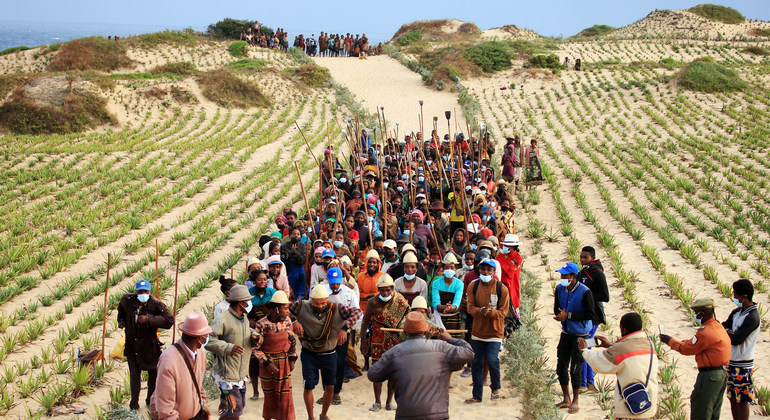Issa Sanogo, the UN Resident Coordinator in Madagascar, visited the area recently and spoke to UN News about how climate change is making life increasingly difficult for the people who live there and how the UN is helping those in need.
“We started the visit in Betroka, an area known for its insecurity because of the presence of ‘Dahalo,’ the local name for cattle rustlers, which is now faced with food insecurity due to drought resulting from low rainfall.
We then moved further south to Amboasary and Ambovombe, two areas located in arid lands, where we encountered populations dealing with crop failures. Here, almost three million people are suffering the consequences of two consecutive extreme droughts. In the town of Amboasary Atsimo, about 75 per cent of the population is facing severe hunger and 14,000 people are on the brink of famine.
This is what the real consequences of climate change look like, and the people here have done nothing to deserve this. Nevertheless, I have seen that they are ready to take up the challenge, with our immediate and medium-term support, and get back on their feet.
In the village of Marovato, located only eight kilometers from Ambovombe, the people have not been targeted for help, as they are considered part of the urban population and therefore do not meet the criteria for support.
However, these people have been significantly affected by sandstorms; all of their croplands are silted up, and they cannot produce anything. Most areas in the south are already in a nutritional emergency, so it is inevitable that women and children will be even more affected if we don’t intervene.
The UN System at work
By integrating and coordinating more aspects of humanitarian aid, we can have an ever-greater impact on communities, and I saw for myself the many ways in which the different parts of the UN System are working closely together, in areas ranging from food distribution and sanitation initiatives, to antenatal and reproductive health care, and agricultural projects.
For example, we stopped in the village of Behara, which is classified as being close to a famine-like situation. This is one of the communities suffering daily from the disastrous consequences of a crisis they did not create. There, the UN Children’s Fund (UNICEF) and the World Food Programme (WFP) were providing nutritional packages to children under five, to treat moderate and severe acute malnutrition. The same communities also benefited from reproductive health services, prenatal and obstetric consultations provided by the UN Population Fund (UNFPA).
The people of Behara are constantly in debt: every time they receive cash transfers, they have to pay back their debts before they can even think of catering to their own needs. We need to create a safety net to help these people trapped in a vicious cycle of debt, and the World Health Organization (WHO) and Food and Agriculture Organization (FAO) are exploring ways to integrate health care and services that can improve livelihoods, so that the population can become more resilient.
Moving further south towards the sea, I was given hope by the enthusiasm I saw from people working on a sisal plantation, which has received assistance from the UN Development Programme (UNDP). Some four hectares of sisal has been planted, but the people we met wanted to grow more, because sisal helps to stop the progression of the sand dunes, which protects their farmland from sand invasion that can make it harder to grow crops.
‘The hunger season is coming’
Donors have given generously towards the Flash Appeal we made at the beginning of the year, providing more than $40 million, which has enabled some 800,000 people to receive life-saving assistance.
However, the drought has gone on for longer than expected, and the funds received are insufficient to cover current and future needs. We must act now: annual crops are a problem that will probably become a new crisis in the next agricultural season. Resilience is the solution, and there is an urgent need to implement long-term solutions led by the Government. However, right now people need support and humanitarian assistance to get them on their feet and making a living.
The hunger season is coming. We are in danger of seeing people who have endured the prolonged drought enter the lean season without the means to eat, without money to pay for health services, or to send their children to school, to get clean water, and even to get seeds to plant for the next agricultural season.
If we don’t act soon, we will face a much more severe humanitarian crisis.”









